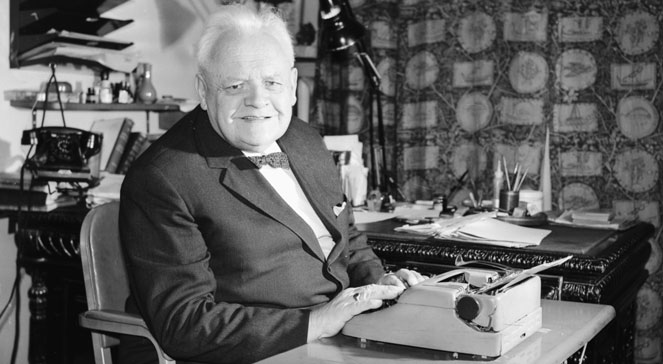 Interview with Krzysztof Kąkolewski:
Interview with Krzysztof Kąkolewski:
BB - Was Wańkowicz hospitable?
KK - Yes. It is common knowledge, that he was very fond of guests, he himself was invited by many people, he organized large and small parties he described. I would like to tell you about the period, when Wańkowicz was alone after his wife's death. It happened, that he called quite late in the evening and spoke: Come see me right away - the invitation was for me and my wife - but not by car. I sit alone like this eagle owl. We dropped by. At this time, Mrs. Marta's landlady was gone - the tableware was prepared just in case 4 persons, the fourth person was sometimes attended by Wańkowicz's neighbor, with whom he played chess. Wańkowicz was characterized by extraordinary care for his guest, and at least he claimed, with no memory, he remembered perfectly what who liked. Because at the beginning of our acquaintance, I asked for a gin and tonic, later, when I changed my tastes, I felt sorry to oppose this proof of memory. When Wańkowicz was working in the kitchen - in the apartment at Puławska Street, the dining room was connected to the kitchen - it was noticeable, that although he always made use of other things in these matters, he is doing great, a bit soldierly.
He opened the refrigerator wide, which contained unbelievable amounts of boxes with fancy canned food. He received them from various sources. Because he knew, I like fish and seafood so he pulled out crabs, smoked oysters and oysters in their own sauce, prawns, homara. The second was cold cuts on a board, previously sliced by Mrs. Marta. There were no hot dishes because how Wańkowicz was supposed to cook them?
As our acquaintance deepened, Wańkowicz less and less often proposed “Trejos devynerios” to the profane he pronounced - "Trisz dyvinis”. So for us it was drinking whiskey - the host was taking out a bottle of champagne for himself. Later he served a box of broken chocolate.
Melchior Wańkowicz: Here and there:
…..That's what I say - only in the Kaunas region they knew how to respect the guest. Kołdun, when is the right one, how you press his tongue against the roof of his mouth, the juice has to be purged in six places at once. Coroners move with a fork to eat him, laugh straight. And I will not give the dumplings a spoon, there will be broth for sure, you have to eat his fat-covered spoon with the same spoon - otherwise it can be harmful.
And here one neighbor from Poniewieza gets up and says her own poems in honor of the kolduna. Successfully even arranged:
Oh, our dumplings from Kaunas!
There is no likeness to them in the world.
Our women made them tasty,
Even Strasbourg pates on the side.
The meat did not come out of the mincer here.
For it was too stiff and crushed.
At this point, the president, which also did not pour Trisz divinis under the table, he leaned over to me:
— Ot, and the one with this razor is clinging to … do you know, pan, then, as you at the hotel mentioned it to me, I felt the knife straight to my heart: and% can not prepare with the machine anymore? I flew scalded, my heart felt well: set the machine to the thickest number and start shooting.
—Have mercy! - I scream - you want to make the bard's second London in Wałbrzych? The pilgrim's longing cannot be appeased? - They explained themselves: - For forty people here, how many dumplings must be sewn by hand?- But they understood, you have to. They sent around the offices, all the female females were torn from the work, the doctor of Kaunas gave a lot of sick leave for this occasion - they managed…”
I have allowed myself to precede the quotes from This Way and This Way by Melchior Wańkowicz with a joking remark, with a note of longing for a dying custom, so clear in many of this great writer's books, allows to assign it to the nineteenth century. In that regard, at least. Mr. Melchior Wańkowicz was not indignant at such classifications, they amused him, and maybe even rejoiced, because - it seems - he dressed himself very consciously in this "nineteenth century."”. Anyway, how unreliable these classifications are! Round dates are not epoch boundaries.
Ignacy Paderewski's visit to Warsaw (r. 1899):
"The master let himself be begged," writes the then journalist, suppressing his alleged aversion to Warsaw and announced three concerts in the castle hall. You have to be the lover of fate, to get a ticket to the concert…”
On this occasion, “a certain social barbarity came to light…” Unworthy of this epoch at the end of the 19th century.
"Social barbarism - writes this journalist - I call prohibiting women from entering feasts, whose purpose is to honor the merits of an excellent husband. Only men have been invited to a similar feast and only they have the right to enter the banquet hall, they circle the table, surround the amphitrion, they worship him with rhymes and prose, they eat the treats, they drink wine, and women are allowed access … to the gallery, from where they can watch their husbands play, admire their eloquence, applaud, throw flowers, irritate the smell of food brought, simmer at the elevated temperature of the gallery, faint halfway, to refresh yourself with a glass of lemonade brought by grace, and when the feast and after the feast, libations are finished, obtain the right to enter the hall and introduce himself to Amphitrion with a beautiful curly hair, what the chancellors are shouting about, concluding the report on the descent from the highlands of living flowers, joining company and wonderful, already having fun together…”
